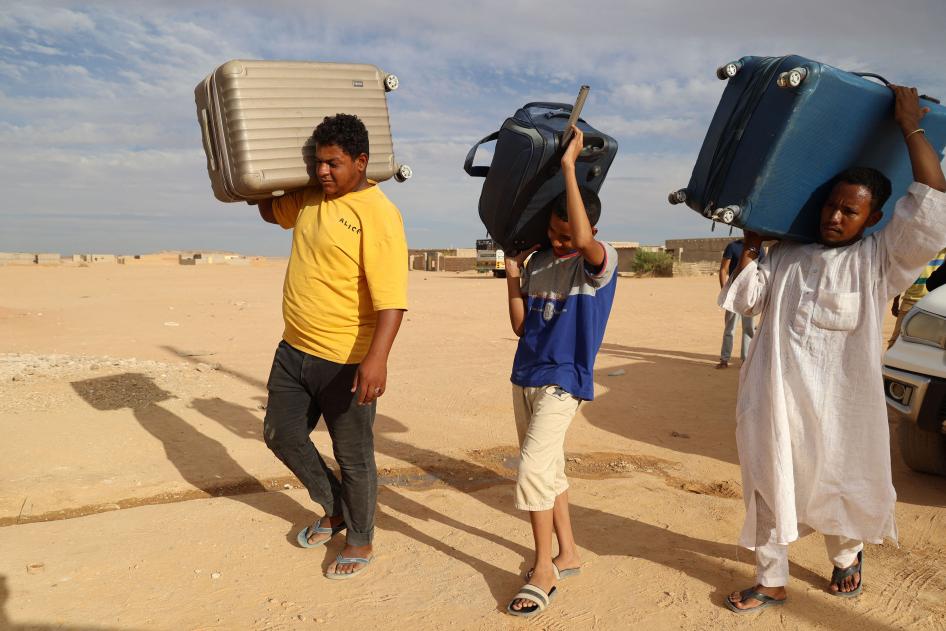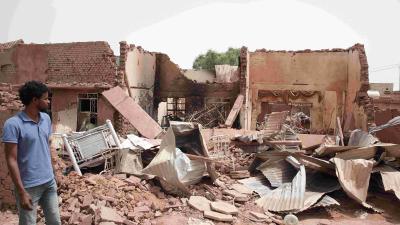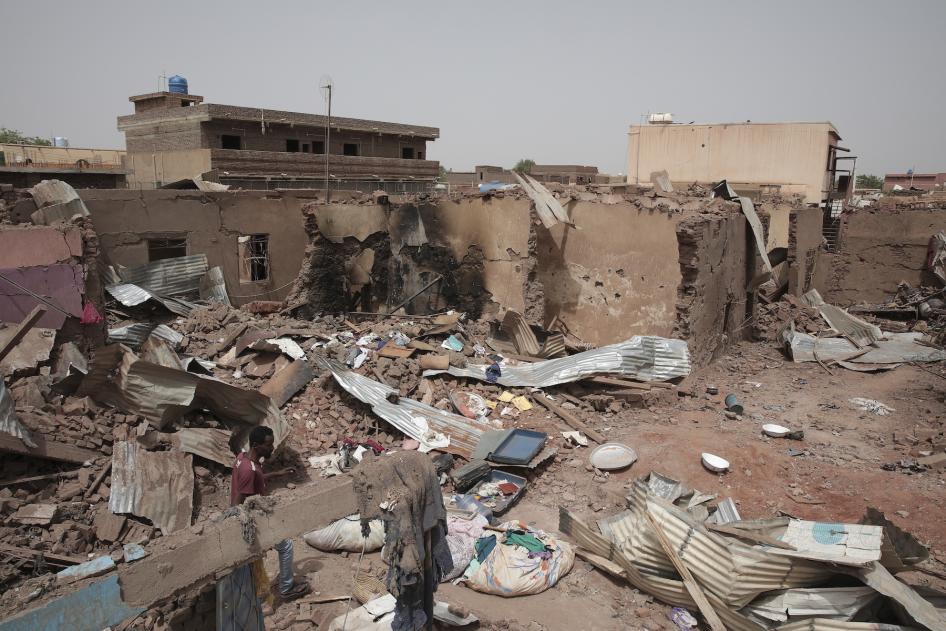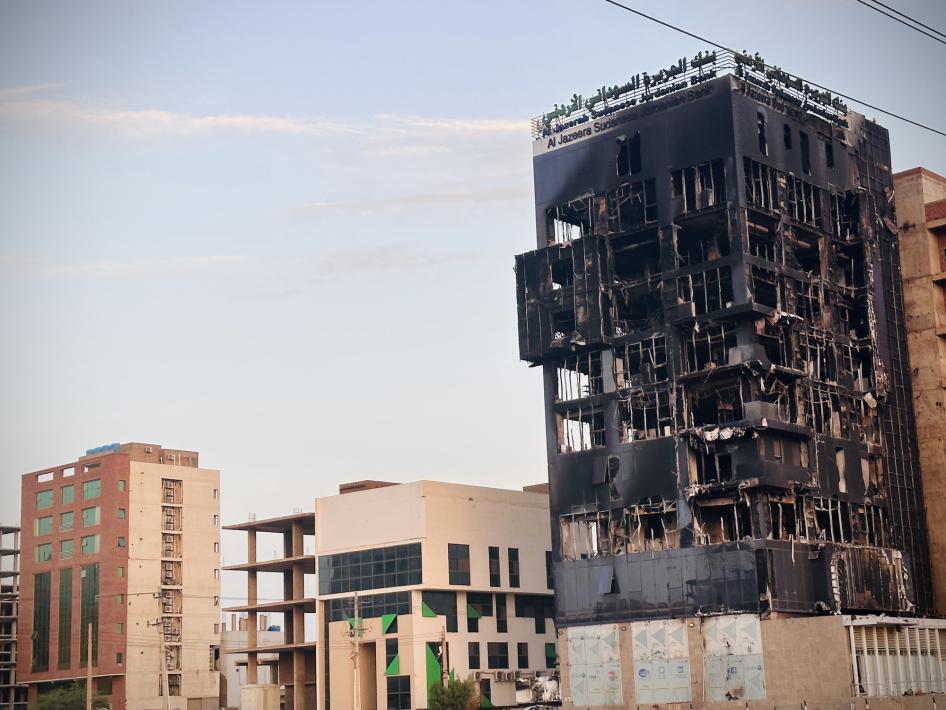What’s the situation like on the ground for people in Sudan?
There is heavy fighting in densely populated areas, in Khartoum and other cities. People are having to decide whether they stay home and risk getting bombed or looted or forcibly evicted, or flee facing risks created by the fighting on the road and the challenges of crossing borders. Many people are stranded where they are. The fighting has damaged civilian infrastructure, so there’s little access to electricity, clean water, and health care. Cellular networks are often down, and there’s only limited access to online banking, which is a crucial way of buying things like food. Also, banks in general aren’t functioning so people can’t get cash. People are trying to survive both the fighting and the devastating impact it’s having on their daily lives.
What’s happening to people trying to flee the country?
Many people in Sudan decided to flee, primarily north to Egypt, west to Chad, or south to South Sudan. At the Egyptian border, we’ve heard about long queues in excruciating heat, slow processing, little access to food, water, restrooms. Many people are sick and there’s no medications available. The Egyptian authorities require visas for males of a certain age, most likely between 16 and 50, which adds to the delays or leads to people in this category being denied entry, and so families are getting separated. Obtaining a visa requires several days or weeks. For the thousands attempting to cross into Chad, the roads from West Darfur are unsafe, and those who flee face dangerous checkpoints, extortion, looting, and the fear of being caught in the crossfire. Neighboring countries should allow those fleeing the conflict prompt access to assistance and to seek asylum, while countries further afield should be helping to create safe and legal passages of flight.
The number of internally displaced people in Sudan has skyrocketed. Are they getting aid?
There’s no good reporting on the number of internally displaced people, because the fighting has dramatically curtailed the movement of humanitarian workers. At least five aid workers were killed early in the conflict and health facilities have been attacked. Because of the insecurity, there has been large-scale evacuations of aid workers.
On May 11, during talks hosted by Saudi Arabia, the warring parties said they would adhere to key obligations of the laws of war, including facilitating humanitarian access.
We know people have gone to eastern Sudan, where it’s safer, and some have gone to the north. Still, many people are still in Khartoum because they can’t afford to flee, have illnesses, can’t walk, or simply don’t want to leave their homes, so many families are facing the excruciating decision of having to leave relatives behind.
Earlier you mentioned fighting in the state of West Darfur. Why does that area have you particularly concerned?
Since 2019, Arab militias joined by the Rapid Support Forces have launched attacks against non-Arab communities in West Darfur. They have killed hundreds and left swathes of towns in ashes. Given the complete lack of protection by government forces, some of the communities targeted in these attacks, notably Massalit communities, have created self-defense militias in response.
The communities in Darfur are still reeling from two decades of conflict and ethnic cleansing. There has been no meaningful process to address the root causes of that violence. These include issues such as accountability for killings and other crimes, access and ownership of land and natural resources, as well reining in abusive forces.
The 2019 ousting of Omar al-Bashir, who was indicted by the International Criminal Court for atrocities committed in Darfur, gave many people hope that there would be sustainable peace and justice in Darfur. But that didn’t happen. Political elites and international actors didn’t prioritize Darfur. Instead, they sent the United Nations-African Union peacekeepers home from Darfur, and the world trusted the Sudanese government would protect civilians without real scrutiny.
Human Rights Watch has been investigating the violence in West Darfur, and it is clear these attacks since 2019 were not “inter-communal” – that is, fighting between local communities. Our research shows that members of the Rapid Support Forces, together with Arab militias, were central to the attacks. The level of weaponry, the direct targeting of internally displaced person camps – this needs to be framed beyond tribal clashes.
Clashes between the Sudan Armed Forces and the Rapid Support Forces, together with Arab militias, began on April 24 in West Darfur’s capital, El Genaina. This was a bit later than the fighting in other parts of the country. Over the past days, I’ve spoken to survivors of this latest round of violence. The Sudan Armed Forces withdrew to their base in the town, leaving the Arab militias and Rapid Support Forces to attack non-Arab communities, some of whom were armed and mobilized. These armed Massalit men clashed with the assailants, who for days wrecked havoc, killing civilians, destroying and looting local markets and key health facilities. They also destroyed several gathering sites that hosted those displaced from past attacks since 2019.
So now you have displaced people once again seeking refuge elsewhere. Residents told me that some of those wounded in late April succumbed to injures for lack of health care. Those who survived face a dire situation with little left to live on.
For years, foreign governments and international bodies failed to respond adequately to the abuses in West Darfur. Many in the region felt the world forgot them. But unless more attention is paid to Darfur, the situation could spiral even further out of control.
How is Human Rights Watch getting information from Sudan?
This is one of the key issues and challenges. Communicating with people in Khartoum has been easier, but recently internet networks keep crashing because telecommunications providers reported a shortage of electricity and fuel. Sometimes you talk to people who are on the move, other times you hear loud gunshots and explosions in the background. Some people describe what they see fleeing from one area to another. Many crossed checkpoints manned with soldiers from either the Rapid Support Forces or Sudan Armed Forces, and everyone I spoke with shared their distress of where this journey would go or what it would lead to. It’s difficult to get verified information in a timely manner. This is why we need a strong international response that would result in better documentation of abuses and preservation of evidence.
Human Rights Watch recently released new research on explosive weapons in urban areas. Why did you choose this aspect of the fighting?
Explosive weapons are often too inaccurate, or their blast radius too wide, to be used in populated areas in a way that respects the laws of war. The use of heavy explosive weaponry in urban areas has not only killed and injured civilians but also significantly affected access to water, electricity, and health care.
People told us about damage to their homes or their neighborhoods. They also spoke of heavily armed forces near homes, putting civilians at greater risk. Doctors talked about shelling on hospitals and being evicted from hospitals, as well as trying to get patients food, water, medicines. Supplies are in great shortage. This has pushed the health sector to its breaking point.
Heavy fighting in populated areas has created a bleak situation. People are stranded in their homes for days. No one can bring them food. They look at social media and share stories of relatives who were injured days ago and then died without getting medical care. These stories are important to understand the urgency of the situation.
It’s the reality of what’s happening on the ground. This is two generals fighting for power. And over the past years, long before the current fighting, they’ve shown utter disregard for civilian life.
What should the international community do now?
Although last week the warring sides said they would follow the laws of war, their terrible record of abuses over the years means they are unlikely to do so without significant external pressure.
After the generals staged the military coup in 2021, we called on the international community to reflect on what went wrong and to do things differently. But we’re not seeing this. As they have in the past, they’re engaging with the military and sidelining the voices of protest groups who said that abusive leaders holding power cannot create a rights-respecting Sudan. Letting these generals off the hook for past crimes has only emboldened them.
Human Rights Watch has three key, interlinked priorities: civilian protection, humanitarian assistance and response, and accountability.
We’re talking about expansion of the international arms embargo. There’s already an arms embargo in Darfur by the UN Security Council, but we want it expanded to limit the abilities of the warring parties to further endanger civilian lives.
We want targeted sanctions imposed on abusive leaders. We’re seeing a wide range of abuses across Sudan. We’ve been calling for this for years, but nothing has happened.
From the UN Human Rights Council, we want a special mechanism to investigate abuses committed since the fighting began with a mandate to collect and preserve evidence and promote accountability. On May 11, the council held a special session on Sudan, but it didn’t establish an independent mechanism to preserve evidence, which more than 100 Sudanese and international organizations have asked for. Instead, the council only enhanced existing mechanisms, falling short of addressing the magnitude of abuses and suffering, as well as the need for a new international approach focused on advancing accountability.
The world keeps telling Sudan’s people that it stands with them, but so far these are empty promises. The world has failed Sudan by appeasing its abusive leaders, and a convincing case needs to be made to Sudan’s generals that accountability is coming. Then the international community would finally be defending the Sudanese people who want a better, peaceful, and just future.
*This interview has been edited and condensed.






